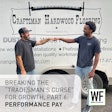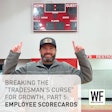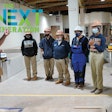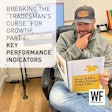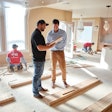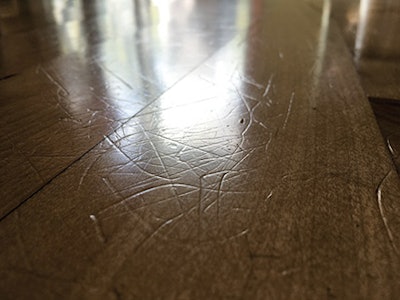
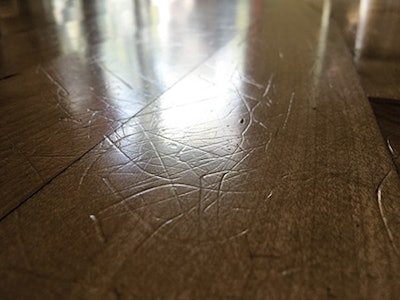 Flooring that doesn't perform as customers expect destroys trust, an essential factor in your success.
Flooring that doesn't perform as customers expect destroys trust, an essential factor in your success.
"The designer specified walnut and my dogs are destroying it. Why would she sell me this product?" "You quoted me a price and now it's costing me more. I've heard this always happens in construction." "You must have been burned before since you are asking me to sign a contract."
You've probably heard something similar whether you're a contractor, distributor or manufacturer. Each of the above statements provides an opportunity to build trust with your customers. Regardless of your job or industry, trust has a measurable impact on business.
What is trust?
People are creatures of exchange, and trust is a dynamic of human relationships. It is something we do and build with others. If you live in Colorado during an unexpected blizzard, you realize how dependent we are on others. How many people does it take to deliver a gallon of milk to the grocery store? Trust is also valuable to your business' survival in an indifferent marketplace.
As a salesperson, I make mistakes that affect our business. Confession: In the recent past, I have forgotten to order nosing on some projects, which costs our business in time and travel. This impacts trust inside our business (introducing doubt in the minds of supervisors and employees) as well as the trust of our customers, causing them to question how thorough we are about price, timeframe, product quality and customer service. Our customers are not the only ones with expectations about our business: Vendors expect to be paid on time, and employees trust us to take care of their needs.
As a wood flooring contractor, I'm a consumer of raw materials. If my sales rep at my distributor, Don Crisp, quotes a price I think is too high, I might throw in the towel and reach out to another distributor for a lower price. However, we've established a relationship built on authentic trust. He does his best to educate me as to the reason for a high price. Maybe there's a shortage of materials, materials are being sourced from a higher-quality mill or the materials I'm requesting are hard to source. Most importantly, he provides me with the opportunity to clearly explain my pricing to my end user: the homeowner. Our relationship has paid off in many measurable ways, from referrals to providing us with equipment to use in a pinch during an unexpected machine repair. While Don is not on our payroll, my husband, Joe, and I both consider him a valuable resource.
The gap between knowing and doing
Knowing how trust works doesn't mean people practice developing it. According to Jeffrey Pfeffer and Robert Sutton, two Stanford University professors, the gap between knowing and doing is harder to bridge than the gap between ignorance and knowing. They call this the knowing-doing problem—the challenge of turning knowledge into actions.
We experienced this in our business. For about half the life of our business, we worked without a contract. It seemed easier on the front end, but there were times the scope of work changed in a way that negatively impacted our timeframes and costs. There were also times when we chased people down, wondering if they had died before they wrote us that final check. We figured the only way to protect our business was to use a contract, even though other contractors had told us it couldn't be done.
We discovered it wasn't easy. That knowing-doing gap is tough. First, we had to trust ourselves: Once we put everything into writing, we would have to follow through on our promises. And, if we couldn't get our contract signed, instead of thinking we failed, we committed to learn what went wrong and how we could fix it. Finally, we didn't start using a contract without a plan, including a strategy for how we would allocate our resources to recruit and work for a specific customer: remodeling homeowners. We knew we would have to spend more time at the beginning of our work, educating our customers and managing their expectations, but the operations piece of our work would proceed much more smoothly with things in writing.
Our plan worked: We placed more value on our business product and service, and our customers now do the same. There are a lot of results that came from the work we did, but the one to highlight here is authentic trust: Even though the quality of our work didn't change, our customers refer us more than ever before.
How to implement and measure trust
Keep it simple. We track how prospective customers hear about us. I ask everyone who calls me how they heard of us, whether they're a prospective customer or a manufacturer or a salesperson from Porch.com. It helps for targeting marketing campaigns and ensuring you know whom to thank for a referral, which is important to grow relationships.
Make requests. Ask for help. It's hard but gets easier over time. We make requests of our manufacturers, our distributor and our employees, but the most frequent requests I make for help are to our customers. Before I do an estimate, I request the homeowner "like" us on Facebook. If they can't be bothered with that simple reciprocity, it's an indicator to me that this person isn't really interested. During the estimate, prior to providing pricing, I request they accept our terms sheet, which spells out several processes (scheduling and payment) as well as what we don't do.
Manage expectations. If you don't like to apologize, set clear expectations. We choose to work directly with homeowners because I can take time at the front end to educate them, not just about product specification but whether we are a good fit for them. "It's very easy to educate builders and general contractors," said no specialty tradesman ever. Managing expectations also is vital for the trust you'll build with vendors and employees. Do you provide employees with a uniform, or do you expect them to look like they just rolled out of bed? Because they will look like they rolled out of bed. Every day. Is that what your customers expect?
Follow through on commitments. If you can't do something you promise, you'll be discovered. Building trust means being open and accountable, and apologizing when you make mistakes. Apologies build trust because you're taking responsibility for your actions. Don't be afraid to fail—as long as you own your actions and learn from the error.
Get feedback. Trust lives in unexpected places, so think outside of the box for feedback to help your business grow and develop. Joe and I constantly bounce ideas off of each other, but I also participate in a weekly phone call with a group of business owners from Miami, Australia and New Zealand. Don't be shy. Ask a respected member of your local business community to serve as your business mentor. Ask the author of one of these magazine articles for advice or feedback. Get on social media, from the closed Floor Sanding and Finishing group on Facebook to Floor Talk on Instagram (both resources offer incredible talent and technical advice).
You'll never know the results of a relationship built on trust until you take action and begin to develop it.
See more from Joni Rocco:
How We Stopped Working Late Nights and Weekends




















